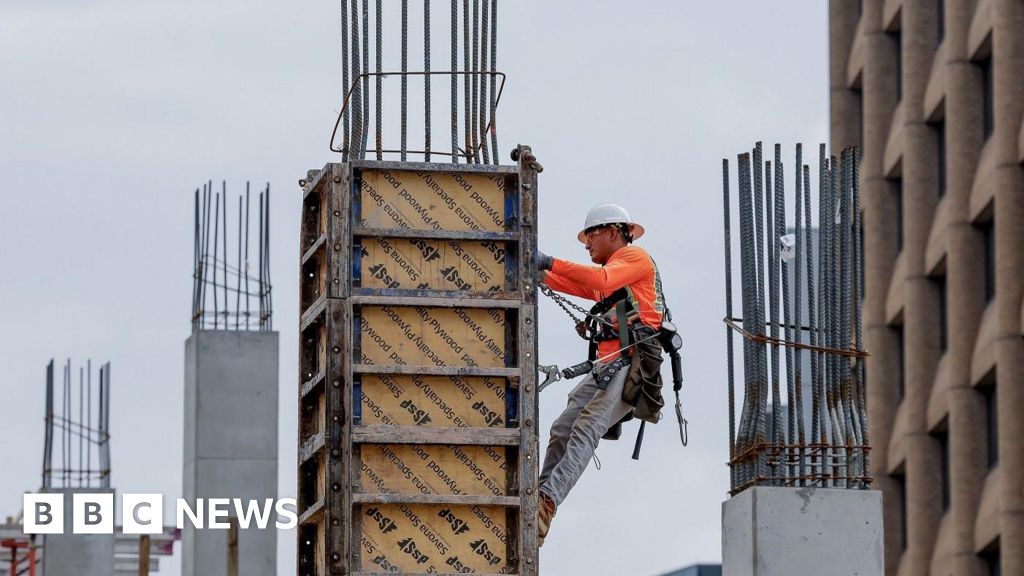ARTICLE AD BOX
By Waiyee Yip
BBC News
Image source, Weibo
Image caption,Cai Niangniang was attacked online for being "offensive" - because of her eyes
"Do I not deserve to be Chinese just because I have small eyes?"
That is what Chinese model Cai Niangniang wrote in a recent impassioned social media post, after old pictures of her went viral for all the wrong reasons.
For several days she had been attacked online for being "deliberately offensive" and "unpatriotic", over a series of advertisements she had appeared in for Chinese snack brand Three Squirrels.
Her apparent crime? Having narrow eyes.
Some social media users were so outraged that the company eventually removed the ads online, and apologised for making people "feel uncomfortable" over them.
But Ms Cai said that she did not know what she had done to get cyber-bullied, noting that she was "just doing my job" as a model.
"My looks were given to me by my parents," the 28-year-old wrote on the Twitter-like platform Weibo.
"Have I insulted China the day I was born just because of how I look?"
'The West no longer has absolute say'
The ads, originally shot in 2019, were dug up by nationalist netizens amid a period of heightened sensitivity online in China over advertisements depicting Chinese people.
In November, a top Chinese fashion photographer apologised for her "ignorance" after a picture she shot for French luxury brand Dior sparked a backlash. It had featured a Chinese model with narrow eyes.
In recent days, there have been other incidents of social media outrage over adverts by Mercedes-Benz and Gucci that featured Chinese women with narrow eyes.
Amid a growing sense of online nationalism and anti-West sentiment in China, some have seized upon these advertisements as examples of racism towards Chinese people. By featuring models with narrow eyes, critics say these companies are perpetuating Western stereotypes of Chinese faces.
Image source, Chen Man/Dior
Image caption,Chen Man's picture for Dior had attracted criticism from some Chinese
Many asked why these adverts did not feature the kind of models more commonly seen in Chinese advertisements who have fair skin and large round eyes, which are typically considered ideal beauty features in China.
A recent editorial by state news outlet China Daily highlighted how "for too long, Western criteria of beauty, and Western tastes and likes and dislikes dominated aesthetics". That included depicting Asian women in adverts as having narrow eyes, it said.
"The West no longer has an absolute say over everything," the opinion piece read.
"The Chinese people do not need to follow their standards on what constitutes beauty and what kinds of women are considered beautiful."
As a Chinese brand, Three Squirrels "should have known about the sensitivity of Chinese consumers to how they are portrayed in advertisements,", it added.
At the heart of the controversy is the perception that such depictions invoke the "slanted eyes" stereotype of Asian people which emerged in Western culture in the 19th century, and which is considered hugely offensive by many Asians today.
Image source, Getty Images
Image caption,Fictional character Fu Manchu (right) perpetuated "Yellow Peril", the racist idea that Asian cultures threatened Western society
In Hollywood, the quintessential Asian villain Fu Manchu was pictured with thin and narrow eyes. The character embodied and perpetuated "yellow peril", the racist idea that Asian cultures threatened Western society.
"There is indeed a long history in the use of 'slanted eyes' to discriminate against Asians," Dr Liu Wen from Taiwan's Academia Sinica told BBC Chinese.
Rejection of aesthetic pluralism
But the insistence among some Chinese on one particular beauty ideal also stands in marked contrast to the current global debate over diversity and the push for wider representation of Asian faces in the media.
Observers say that while it is understandable that some consumers would be offended over the adverts, the outcry is also too simplistic as it rejects the idea that there can be in fact many different ways to look Chinese.
"Rejecting 'slanted eyes' is a very dangerous phenomenon, because it is the rejection of aesthetic pluralism," Dr Luwei Rose Luqiu from Hong Kong Baptist University said.
"It's stifling beauty that does not meet a certain standard."
Experts have also pointed out that traditional standards of beauty in China had in fact favoured narrow eyes. For example, paintings from what is widely considered as China's golden age for art and culture, the Tang Dynasty period from 618 to 907 AD, prominently featured women with long, narrow eyes.
"Despite some variations across different dynasties, more narrow eyes were preferred in ancient China," said Dr Jaehee Jung, a consumer behaviour expert at the University of Delaware.
The current preference for large round eyes, ironically, may be a recent phenomenon influenced by the West. Some experts believe the latest shift in beauty standards began around the late 1970s, thanks to exposure to foreign advertising and entertainment when China opened its doors to the world.
"Women in contemporary China seem to endorse much of the Western standards for female beauty ideals pervasive in media images," said Dr Jung.
These days, large round eyes are so prized that it is not uncommon for young Chinese women to wear makeup or even undergo cosmetic surgery procedures to make their eyes appear bigger, such as creating a "double eyelid" crease.
But for Ms Cai, the model at the centre of the latest controversy, she hopes that people can be "kinder" to those who look different. She said in her Weibo post that there was no need to attack her even if they did not appreciate her particular look.
"My eyes are just like this, in fact they're even smaller in real life [than in the ads]... Everyone has their own charm!"
Additional reporting by Sylvia Chang from BBC Chinese.
You might also be interested in:
Standing in front of a smartphone and selling has become a serious career choice for China's young.
Livestream selling: Standing in front of a smartphone and selling goods is an industry expected to boom in China

 3 years ago
49
3 years ago
49








 English (US) ·
English (US) ·